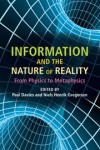As director of the BEYOND Center for Fundamental Concepts in Science, Paul Davies has had a busy few weeks. First, he announced a key discovery that would impact the search for intelligent life. Then, he proposed a solution to space travel that might make future exploration—and potentially even space colonization—possible.
Scientists previously thought that life depended on six key elements: oxygen, hydrogen, carbon, nitrogen, sulphur and phosphorus. But the discovery of arsenic-eating bacteria in California’s Mono Lake shot down this theory. Although it typically feeds on phosphorus, the bacteria can incorporate arsenic into its molecular structure instead, when phosphorus is in short supply. The two elements have similar chemical structures, which initially led the team of scientists to look bacteria in arsenic-heavy locations.
“This organism has dual capability – it can grow with either phosphorus or arsenic,” Davies told The Guardian. “That makes it very peculiar, though it falls short of being some form of truly ‘alien’ life belonging to a different tree of life with a separate origin. However, GFAJ-1 may be a pointer to even weirder organisms. The holy grail would be a microbe that contained no phosphorus at all.”
What does this discovery mean? It’s not the “take me to your leader,” type of alien that Twilight Zone or X-Files fans might imagine. But the unearthing of the bacteria suggest that life might be out there after all—maybe where we least expect it.
Since environmental conditions don’t necessarily have to include phosphorus to support an organism, it opens new possibilities around the universe for alien life. Scientists used to limit their searches to planets with phosphorus, but now they have more opportunities to explore.
Unfortunately, money for space exploration is tight. That’s why Davies is proposing a solution that could change the game: one-way trips for pioneering astronauts. Although Mars offering a promising target for human exploration and potential colonization, budgetary restrictions are currently insurmountable. Davies calculates that one-way trips could save 80% of expenses for such a voyage.
So far, although NASA has been less than supportive of the plan, the hazards of the mission haven’t deterred everyone. Since the proposal was presented, Davies has already had dozens of offers from potential interplanetary pilgrim s willing to leave Earth forever in the name of science (and assured fame).
s willing to leave Earth forever in the name of science (and assured fame).
Davies writes about this and more on a section of his website, “Wild Ideas I Like to Think About.” For more wild ideas from Davies, check out Information and the Nature of Reality as he and other eminent scientists, philosophers, and theologians chart various aspects of information, from quantum information to biological and digital information, in order to understand how nature works and why things in our universe are the way they are.
Latest Comments
Have your say!